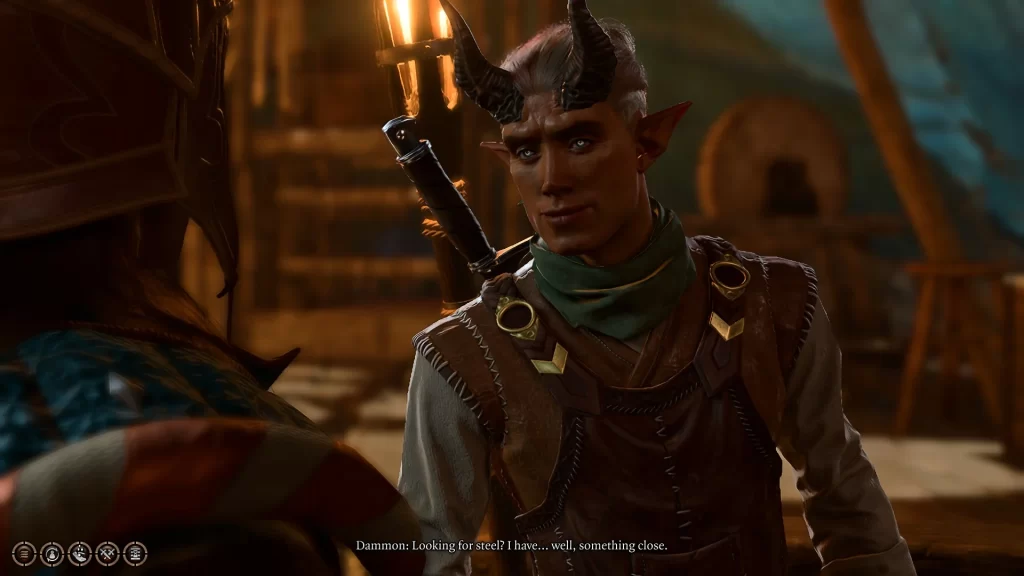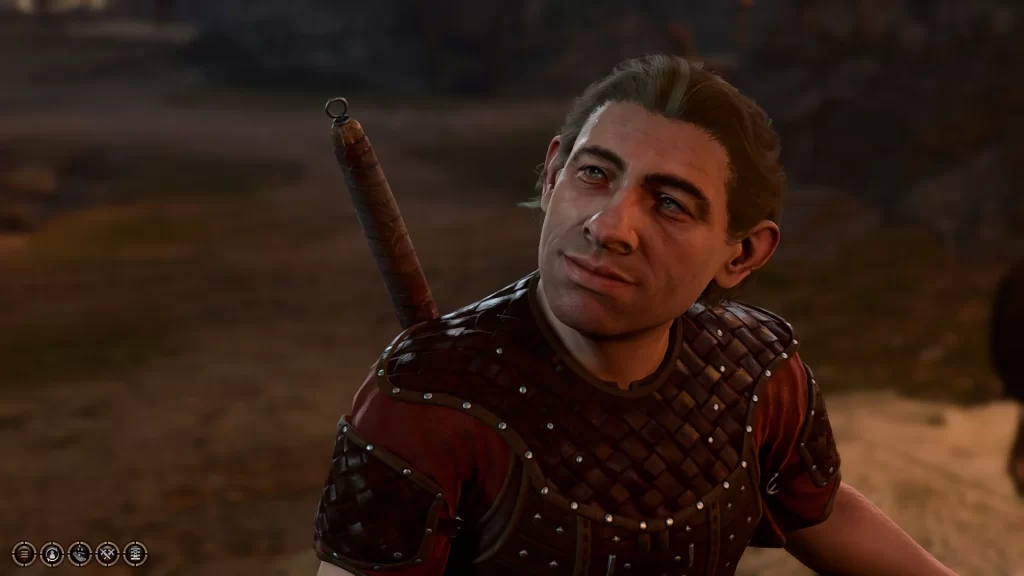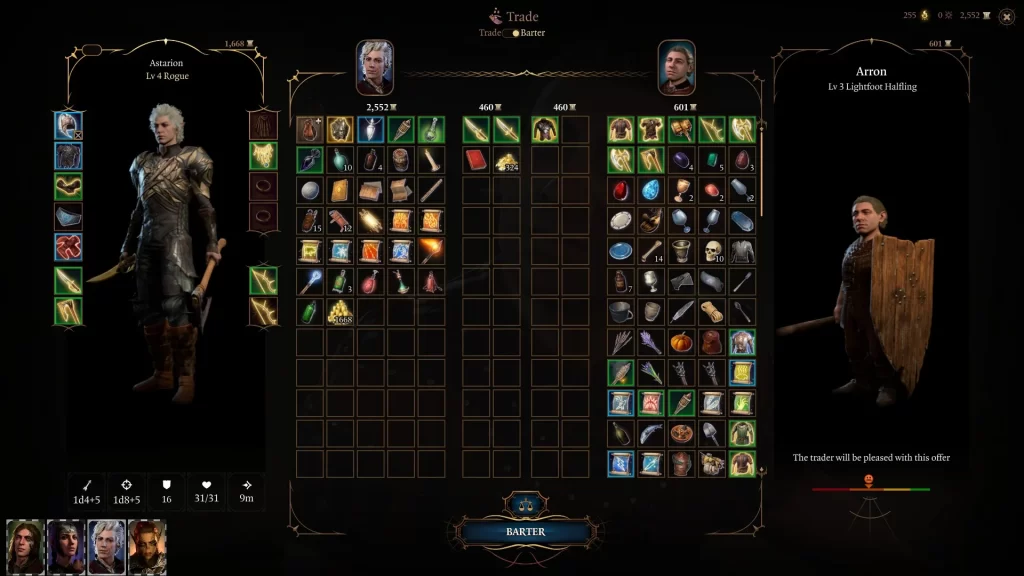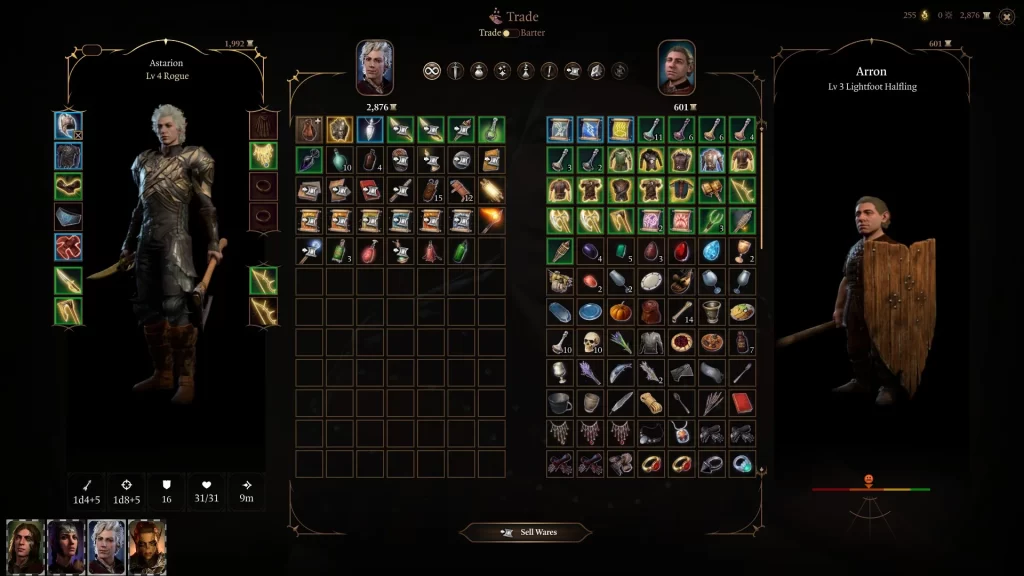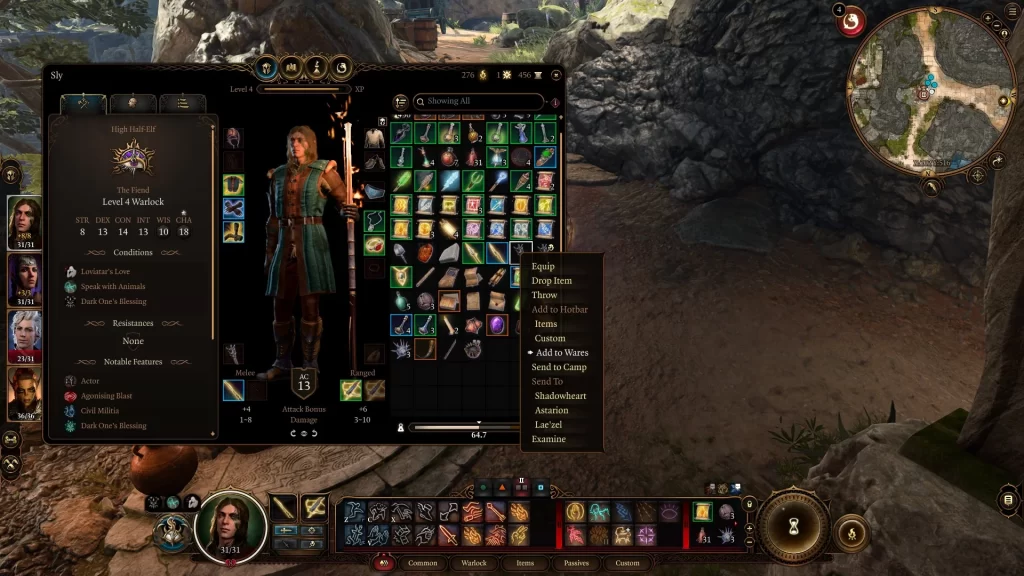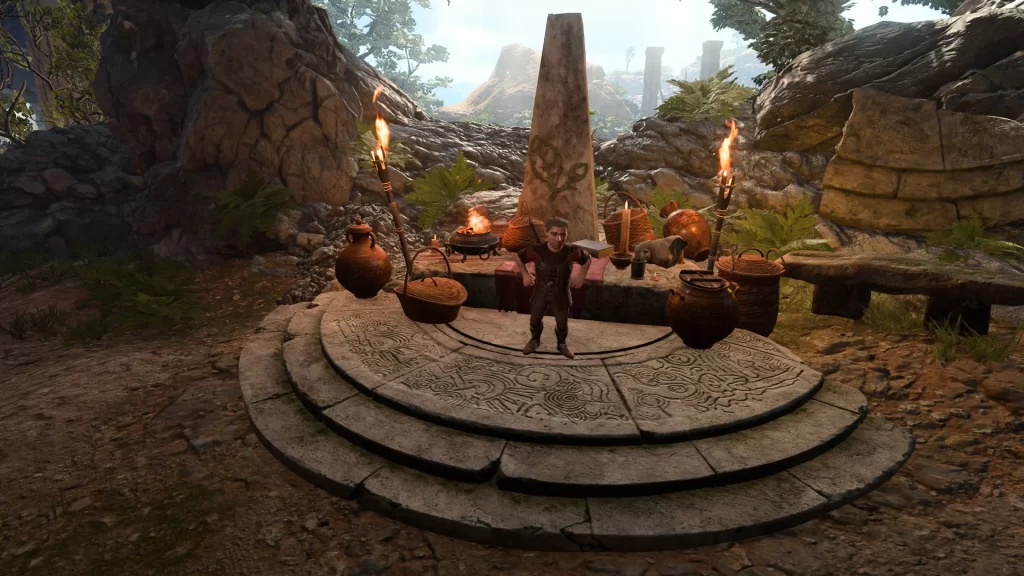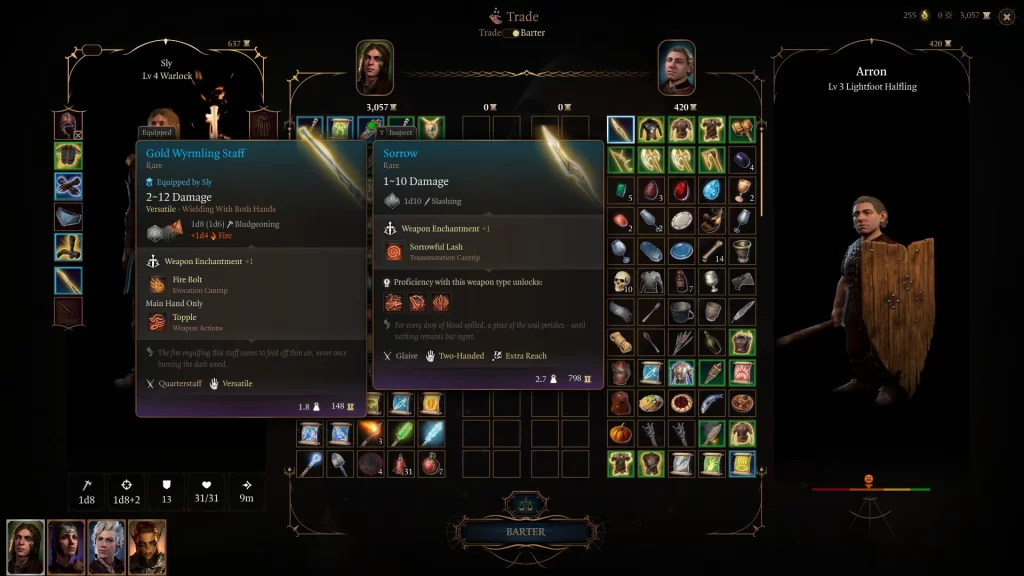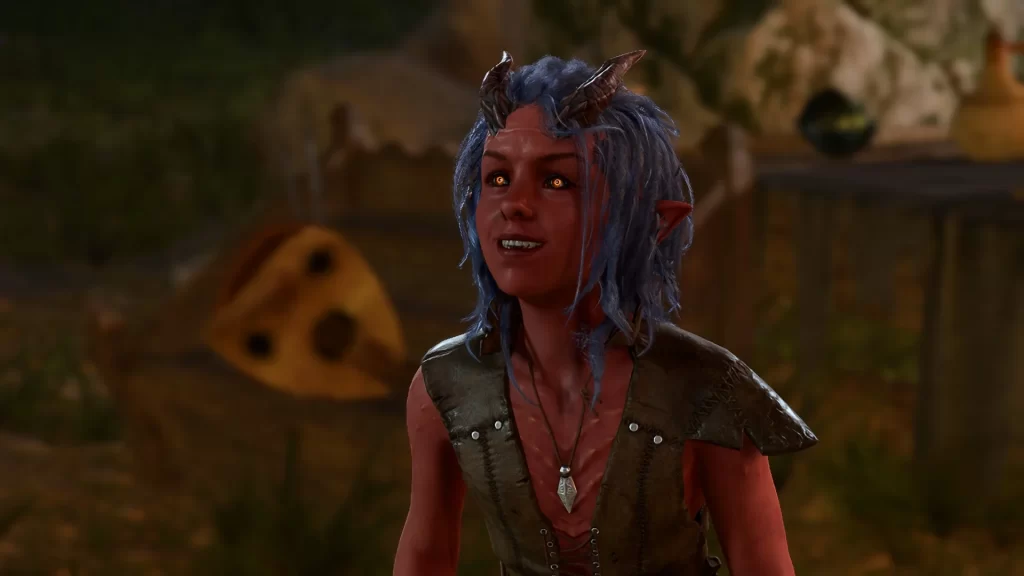Players trying to get the best deals when bartering in Baldur’s Gate 3 will probably wonder how bartering and trading works. While some of you may have never even noticed there’s a difference between the two. Funnily enough, it’s easy to go through the entire game without ever using the Trade tab. Despite the one or two benefits of it.
We’ll dive into the differences between both trading methods while selling and buying from merchants. As well as how much attitude/reputation can play into gold costs at a trader. There are a few different tricks for getting the most out of what you sell and buy.
How Does the Barter Tab Work
By default, you’ll always enter the Barter method of selling and buying when speaking with a merchant. One of the first traders you’ll likely meet as mentioned in our guide on what items to sell is Arron. If you want to change to the Trade method, the top-center of your screen on PC has a switch you can click.
However, the main benefit of bartering is that you can trade items for other items. So if you’ve ever played an RPG where a merchant has a limited amount of gold, this comes in handy. Instead of no longer being able to buy your items, you can trade items for ones you may want. Like healing potions or strong spell scrolls.
With that said, the reason you can play Baldur’s Gate 3 without using the Trade option, is because you don’t need to barter items. You can still place gold in the barter window to buy items. But, you can also place items alongside your gold if you want to mix and match. This makes it usually the more convenient way of trading.
The Barter trading method is also the only way to increase an NPC’s attitude via trading. For more info on how attitude/reputation works, our third section further down dives into it. Alongside an approximate percentage for discounts and more.
How Does the Trade Tab Work
Now that you understand how the Barter tab works in Baldur’s Gate 3, let’s quickly describe the Trade option. While this isn’t the default window when trading, you still may occasionally want to use it. As mentioned in my guide on items to sell, you can essentially mark items as junk to quickly sell.
This is the Add to Wares option when right-clicking an item on PC. However, if you try to add a special item to wares like one with an orange background, it’ll usually not work. This is likely because it’s an item you can’t sell.
The main benefit of the Trade tab is that it has a Sell Wares button where you can instantly sell everything marked as wares. You’ll still need to cycle between each character’s inventory, but this is the best way of doing it. Otherwise, you’ll need to manually add each item if you’re using the Barter tab.
Aside from that, there isn’t much more to the Trade method that makes it superior or inferior. If you’d prefer to buy items instantly without having to add gold or items to the barter window, you can use this method. It feels like more of a personal preference.
How Does Attitude Work in Baldur’s Gate 3
There are two tricks for getting better deals with one of them revolving around Attitude. This represents how an NPC feels about your character when trading/bartering with them. Typically, a character’s Attitude won’t change often. So it’s easy to almost never even notice this mechanic exists.
Unless of course you knock them out or get caught stealing from them. Then, they’re more likely to have a negative Attitude toward whoever did the action. But, if you want to get a discount on their items or even sell yours for more gold, you’ll need to increase their Attitude.
The best way of doing this is simple but it can get expensive depending on what level you are. Let’s start with Arron from the Druid Grove in Act 1 as an example. If you want to raise his Attitude from 0 to 100, you’ll need to give away free items or gold until you reach a certain value. Here are several levels and their required gold value:
- Level 3 – 600
- Level 4 – 800
- Level 5 – 1,000
- Level 6 – 1,400
Upon reaching 100 Attitude with Arron, you can get around a 24% discount and upsell on your items. However, this discount varies depending on your character’s Charisma and potentially other unknown factors I haven’t figured out.
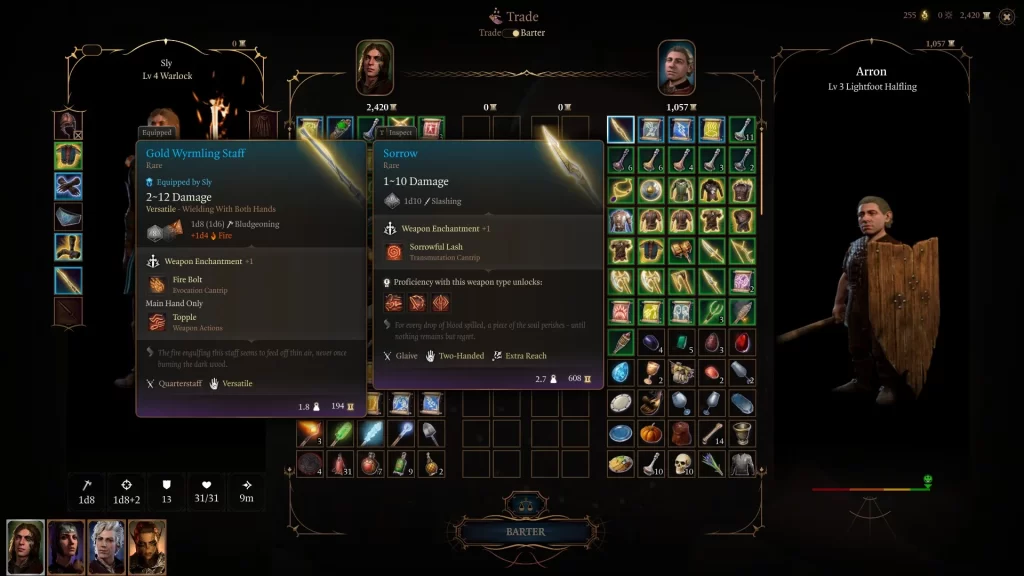
If we get Arron’s Attitude up to 100 and then try to buy that same Sorrow glaive, the cost drops by 190 gold.
As someone who beat Baldur’s Gate 3 without paying attention to this mechanic, I don’t think it’s worth focusing on. It almost feels too expensive and forces you to constantly revisit the same merchant. And even still, you may not make your money back.
Since we know the cost increases as you level up, traders in later acts can get quite expensive. For example, at level 8 it costs 2,400 gold to get an Act 2 trader from 0 to 100 Attitude. Whereas one of my saves in Act 3 cost as high as 4,500 gold to increase a trader to 100.
If you don’t want to mess with the Attitude system but still want a discount, you can use your most charismatic character. Just make sure you start the conversation with that character. Afterward, you can swap between characters in the trading window to still benefit from their Charisma or Attitude.
Is it Better to Barter or Trade in BG3?
The quick answer is that it’s usually better to Barter since you can do almost everything from that method. Even though you can’t sell all wares immediately, so you may still want to swap back and forth. Just make sure to take advantage of the bottom button that automatically adds how much gold you need for your barter.
How Do You Make Traders Like You?
This completely revolves around the Attitude system mentioned more in detail above in our guide. If you want a trader to like you, you’ll have to donate a lot of items and gold to them. Unfortunately, there aren’t many opportunities to raise Attitude via events like completing quests.
Otherwise, that’s all there is to this guide on how bartering and trading works in Baldur’s Gate 3. Altogether, it’s a relatively simple system even though there are some quirks to it. Feel free to check out some of our other guides I’ve recommended below.
- What Happens If You Die in Baldur’s Gate 3
- What is The Dark Urge
- 10 Best Baldur’s Gate 3 Tips and Tricks

Jeff is a journalist with over 10 years of experience writing, streaming, and making content about video games. With an associate degree in journalism, he’s a sucker for RPGs, survival games, roguelikes, and more.

